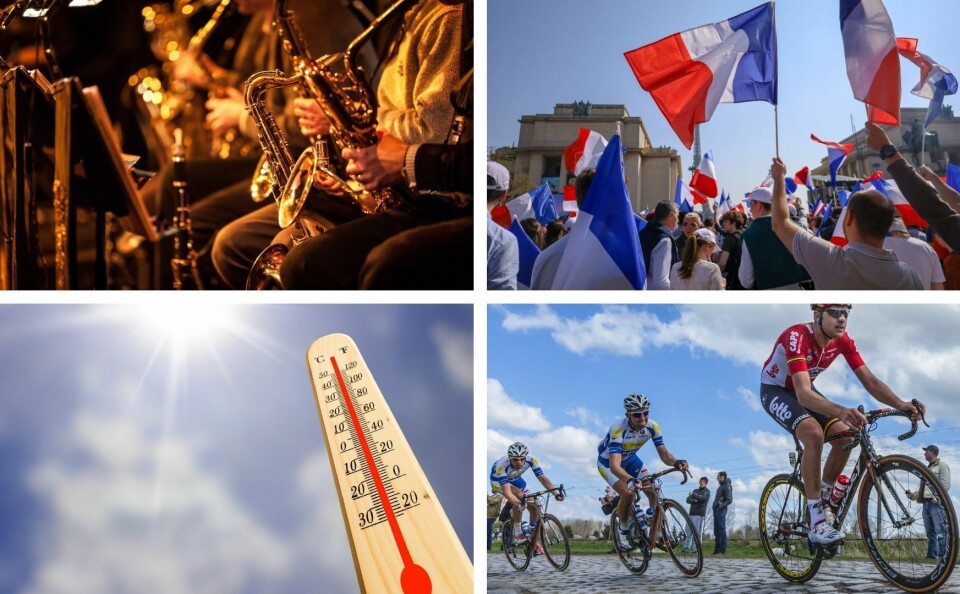-
French weekly weather forecast January 5 - 9: bitter cold and snow
Up to 10cm of snow is due in Brittany and Normandy. Toulouse, Dordogne and the Pays Basque will also see flocons
-
Free fraud service for UK homeowners living in France
Owners are encouraged to sign up for a free monitoring service from HM Land Registry to reduce risk
-
New civic tests for foreigners in France launch amid criticism
Applicants for some types of residency cards must now take 45-minute test
What’s coming up this week in France (July 11)?
Temperatures of up to 40C, celebrations for the Fête Nationale, two top music festivals and more

Another heatwave on way
France is facing a heatwave (vague de chaleur) this week with southwestern areas and the Rhône valley forecast to see temperatures of up to 40C in some areas.
➡️ Mardi :
— Météo-France (@meteofrance) July 10, 2022
Les températures atteindront 34 à 36 °C sur une bonne partie ouest et sud du pays, jusqu'à 36 à 38°C des Charentes au sud-ouest et à la vallée du Rhône. pic.twitter.com/sQNiRF6yVG
The heat is the result of an anticyclone and a ‘thermal plume’ coming from the Sahara and is expected to last at least 10 days.
Temperatures already began to rise over the weekend and should get to 30C across much of the country and 38C in the hottest areas today (July 11).
Read more: A week of (very) hot weather for France ahead
Forecasters predict that the heatwave will be less intense than that of 2019 which saw more than 1,500 people die as a result but it will last for longer.
It is possible that the vague de chaleur could turn into an official canicule – when temperatures remain above a certain level at night for a period of three days or more – so meteorologists are following the situation closely.
Météo France has placed 13 departments under a yellow canicule alert to encourage vigilance among residents.
These departments are: Morbihan, Loire-Atlantique, Vendée, Charente-Maritime, Charente, Gironde, Landes, Haute-Garonne, Tarn, Gard, Vaucluse, Ardèche and Drôme.
Fête Nationale 2022
France’s Fête Nationale (often referred to as Bastille Day by English speakers) falls on Thursday (July 14), and, as a public holiday, will be an opportunity for many workers to faire le pont (make a bridge) to the weekend and take Friday off as a day’s holiday so as to have a four-day break.
Read more: Faire le pont: When are France’s four-day weekends possible?
The celebrations always include a military parade down the Champs-Élysées and other locations around France, which has been a tradition since 1880.
La Fête Nationale is also the occasion for Firemen’s Balls (Bals des Pompiers), when fire stations throw parties in their courtyards or at other venues, inviting the public to enjoy food, drink, live music, discos and more.
As the wildfire risk builds with the hot summer weather, several maires – especially in southern France – have decided to cancel this year’s fireworks displays to avoid sparks catching on dry vegetation.
For what’s happening in politics this week see here: Spending power, Paris football final: The week in French politics
Marseille Jazz des cinq continents music festival
Until July 23, residents of and visitors to Marseille will be able to enjoy the 22nd edition of the Jazz des cinq continents festival.
The festival will see a total of 28 concerts take place across Marseille, showcasing jazz from all over the world while staging a tour of the city’s historic sites.
On Wednesday (July 13), for example, there will be a concert at the Musée des Civilisations de l’Europe et de la Méditerranée exploring music from countries including Estonia, Morocco and Armenia.
There will also be free concerts on offer as well as performances taking place during the day.
Further information can be found here.
Le Festival des Vieilles Charrues
This week will also see the 30th year of the popular Festival des Vieilles Charrues, which takes place in Carhaix-Plouguer (Finistère).
‘Les Charrues’ explores all different musical genres, from pop to electro to folk, and has a capacity of up to 280,000.
The festival, which begins on Thursday (July 14) and ends on Sunday, will feature the likes of Stromae and DJ Snake among many others. You can find out more here.
Steep climbs for the Tour de France
This week, the racers taking part in the Tour de France will see some of their steepest climbs as they move from Morzine to Megève (Haute-Savoie) tomorrow (July 12).
Then, on Wednesday, they will travel from Albertville (Savoie) to the Col du Granon Serre Chevalier (Hautes-Alpes), the highest point of the race.
Towards the end of the week they will descend towards Carcassonne (Aude).
Yesterday (July 10) saw stage nine of the race between Aigle and Châtel les Portes du Soleil won by Luxembourg’s Bob Jungels.
However, the Slovenian Tadej Pogacar continues to lead overall.
Le classement de cette neuvième étape, qui marque la fin de la première semaine même si les coureurs ont déjà eu un jour de repos lundi. Tadej Pogacar et Jonas Vingegaard reprennent trois secondes sur le reste des leaders. #TDF2022 pic.twitter.com/im5dE2HV3u
— Le Gruppetto (@LeGruppetto) July 10, 2022
The 80th anniversary of the Rafle du Vel’ d’Hiv’
This week marks 80 years since the Rafle du Vel’ d’Hiv’, when around 13,000 Jewish people were rounded up in Paris and its surroundings and taken to the Vélodrome d’Hiver bicycle racing stadium.
The arrests by French police took place between July 16 and July 17, 1942, organised by the Vichy government, which was following orders from the Nazi head of the police and SS in occupied France, Carl Oberg.
This round-up differed from previous arrests in that the people taken to the Vélodrome were largely families, and included 4,000 children.
They were held in the stadium – whose glass roof created a greenhouse effect amid the summer heat – with almost no food or water, before being taken to Drancy, Pithiviers and Beaune-la-Rolande internment camps, and then to the extermination camps.
Related articles
Trains, roads, flights, ferries: Ten travel updates for France
























